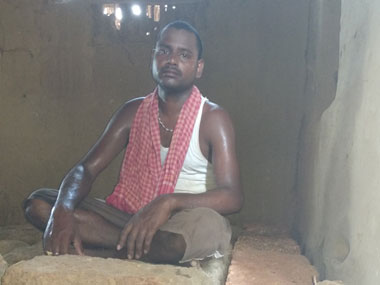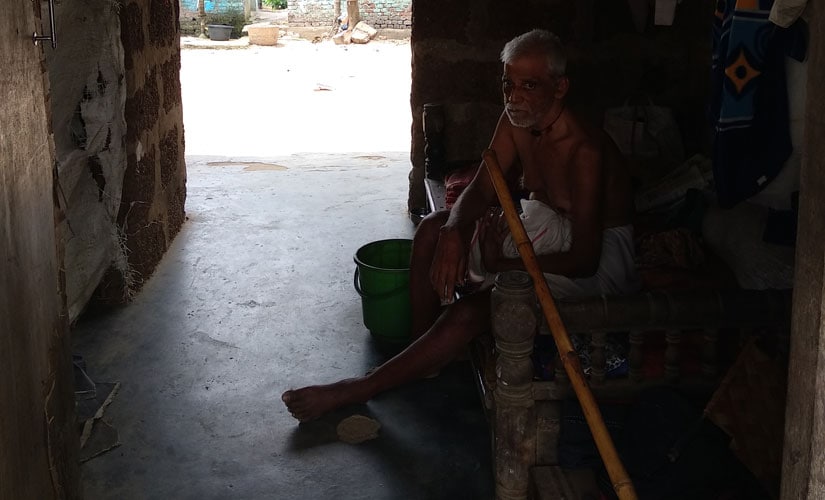It’s a relatively better off afternoon on 2 June. Though the temperature is just above at 36° Celsius, the passing clouds and occasional breeze have brought the much-needed respite for the people from the baking heat and unbearable humidity since Cyclone Fani struck coastal Odisha, a month ago, on 3 May. The trail of devastation that the cyclone caused still exists and the struggle to get everything to normalcy is still on. From the early morning, Trilochan Behera, 68 of Angarapada village in Turintira panchayat of Khordha district’s Balipatna block, has been chopping the Eucalyptus trees, lying on the ground roughly 300 metres away from his house. For over the last seven days, keeping the tiring weather in mind, he would leave early for the same job and return at 11 am. However, as the condition is favourable today, he put in an extra couple of hours of labour. His son Pradipta, 34, is still busy, cutting the logs.[caption id=“attachment_6755001” align=“alignleft” width=“380”]  Pradipta Behera in the badly ravaged bedroom by Cyclone Fani. Photo credit Debi Mohanty[/caption] The scary, cyclonic storm, Fani, not only uprooted Trilochan’s eight full-grown trees, but it also battered his life. He lost his wife, and Pradipta, his mother, Haramani, 58. That morning, Haramani had ignored others advice to move to a safer place as she was determined to stay put in her two-room house. However, when the fierce wind blowing at 180 kilometres an hour uprooted a coconut tree that fell on the house, she got scared and decided to move to a safer place. But as luck would have it, the moment she stepped out of her house to go to a relative’s place close by, a huge branch fell on her killing her instantly. According to Pradipta, the local sarpanch, Sulochana Swain gave them Rs 2,000 under the Harischandra Sahayata scheme for the cremation. His family also received Rs 10,000 from the government to carry out the final rites of his mother. A local grassroots level politician had also helped them with a few hundred rupees. The Behera family also received the initial relief of Rs 2,500 and 50 kilograms of rice as distributed by Odisha government. Pradipta claims to know, from newspapers, though, that families of deceased persons would be paid Rs 4 lakh from the government. “The revenue inspector and some other government functionaries had conducted a survey in the village, taken pictures of our house. But the money is yet to reach,” he informs. Harapriya recalls, a few days after Fani and Haramani’s death, one lady officer along with three policemen had visited them. Since that fateful day of the cyclone, Pradipta has been absent from his job. He works in a roadside south Indian restaurant at Nimapara. Pointing to the ravaged room, he says, “My father and I have re-thatched the roof of the room where my parents slept. The walls (of mud and bamboo) are yet to be repaired. I can go to work after the room is ready and also the wooden logs are brought home,” he thinks. “We thought of selling the logs of the trees, but there are no buyers,” he complains. Not only the Beheras are facing this crisis, but the same story is also visible in every house and villages. Ironically, Fani has disturbed the demand and supply theory of economics. Post Fani, with thousands of trees fallen everywhere, it’s a new equation today in the state – supply overrides demand. “We don’t have the resources, or the space to store the logs for future use: to make doors and windows. Now, we will use it for cooking,” Pradipta, says as a matter of fact. Even a month after Fani, the village is still in darkness. Pradipta and his neighbours believe it may take a minimum of 15-20 days before the power supply is restored. “The poles are still lying on the ground. First, they have to be replaced and the wires will have to be pulled,” says a villager. In order to stay connected, Pradipta and others in the village have been charging their mobile phone batteries at a shop in the nearby Naroda bazaar. Every time they use it, they have shell out Rs 20 to avail the facility. Even, for that one has to be in the queue. “We deposit the phones in the morning and collect in the evening. All from the nearby villages depend on the same shop,” says Pradipta. Without power, particularly in the nights, to avoid the heat, Trilochan has been sleeping on the narrow, muddy passage to his house, next to his damaged bedroom of over three and a half decades. In order to stop the entry of dogs or other animals, he has put up a gate made of bamboo, at the entry point. In the same village, a few houses away from Trilochan’s, across the concrete road, 72-year-old Brajakishor Das is sitting on a charpoy in the narrow passage, which is the entrance to his two-room house. Das has been paralysed in the left side of his body since 2009. On the morning of 7 May, four days past Fani, the septuagenarian was sitting there too, when he heard his wife Manorama 67, cry aloud for the last time. Terrified, though he tried his best to rush to her rescue, his legs betrayed him. Two of his four sons, Jagannath (43) and Sitanath (34) were inside his severely affected house. Brajakishor frantically alerted them. [caption id=“attachment_6755031” align=“alignnone” width=“825”]  Brajakishor in his home. Photo credit Debi Mohanty[/caption] Minutes later, when his sons and neighbours reached the spot, they found Manorama crushed under the heavy muddy wall of the room, just next to where Brajakishor was sitting. The rain-soaked wall that was weakened by the wind during Cyclone Fani, came crashing on her. With hope against hope, her sons hurriedly rushed her to the Balipatna community health centre in a government ambulance. Doctors there referred Manorama to the government-run Capital hospital in Bhubaneswar. There, they were informed of what they feared most: brought dead. “I couldn’t see her properly before she was taken to the hospital,” says Das. However, he has made amends in the last month, to live with truth, till his, as he says, ‘last day.’ “I have lost everything. It’s not my physical inability, but, loneliness, which is giving me unbearable mental pain,” he murmurs, staring at the road, outside. Das’ sons have gone out with their autorickshaws in search of livelihood. The wall that crushed Manorama is still grounded. According to Das, the government had assisted his family for the cremation of Manorama under the Harishchandra Sahayata Scheme. He also informs his son had received the cyclone Fani relief assistance Rs 2,500 and 50 kilograms of rice. However, he is not sure of any other assistance. “Had it come, my sons would have informed me. I think they haven’t got the Rs 4 lakh from the government. Tonight after they return I will ask them and inform you,” he says.
The trail of devastation that the cyclone caused still exists and the struggle to get everything to normalcy is still on.
Advertisement
End of Article


)

)
)
)
)
)
)
)
)



